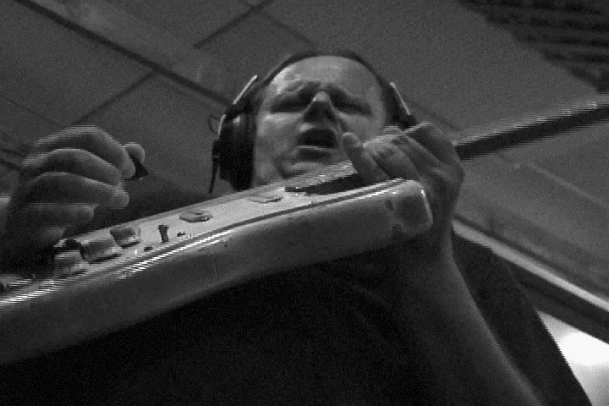
Born: Jan 6, 1944 in Washington, D.C.
Died: Jul 6, 1979 in Englewood, NJ
Although best known to the listening public at large for his lone headlining hit, the disco blockbuster "The Hustle,"
Van McCoy in fact enjoyed a long and remarkably prolific career behind the scenes as a songwriter and producer, piling up a series of soul hits prior to his premature death at the age of just 39. Born Van Allen Clinton McCoy on January 6, 1940, in Washington, D.C., as a child he sang with the Metropolitan Baptist Church choir, and by the age of 12 he was writing his own songs in addition to performing in local amateur shows alongside older brother, Norman Jr.
The McCoy siblings eventually partnered with high-school friends
Freddy Smith and
Paul Comedy in the doo wop combo the
Starlighters. Serving as their lead vocalist, writer, and music director, Van masterminded the Starlighters' 1956 debut single, "The Birdland," a novelty dance record that generated enough local interest to earn them an invitation to tour the East Coast in support of drummer
Vi Burnsides. As military and marital obligations forced the group to dissolve during the months to follow, McCoy entered Howard University to study psychology, but dropped out after a year to pursue a full-time career in music, relocating to Philadelphia and forming his own label,
Rockin' Records. In 1959 Rockin' issued McCoy's debut solo single, "Hey Mr. DJ." While not a major hit, the record did earn the attention of
Scepter Records owner
Florence Greenberg, who hired him as a staff writer and A&R rep -- there he penned the 1962 hit "Stop the Music" for the
Shirelles before signing on with producers
Jerry Lieber and Mike Stoller as a writer with their
Tiger and
Daisy labels. Over the next several years McCoy penned a series of hits, among them
Jackie Wilson's "I Get the Sweetest Feeling,"
Gladys Knight & the Pips' "Giving Up,"
Betty Everett's "Getting Mighty Crowded,"
Ruby & the Romantics' "When You're Young and in Love," and -- best of all --
Barbara Lewis' celestial "Baby, I'm Yours." With then-girlfriend
Kendra Spotswood, he also wrote, produced, and performed a series of pseudonymous singles, including the
Pacettes' "You Don't Know Baby,"
Jack & Jill's "Two of a Kind," and the
Fantastic Vantastics' "Gee What a Boy." (Under the name
Sandi Sheldon, Spotswood also recorded the McCoy-penned stomper "You're Gonna Make Me Love You," one of the crown jewels of Britain's Northern soul club scene.)
In 1966 McCoy signed to
Columbia to record a solo LP, the
Mitch Miller-produced Nighttime Is a Lonely Time; the following year he formed his own short-lived label,
Vando, as well as his own production company, VMP (Van McCoy Productions, natch). Beginning in 1971, McCoy began a long and fruitful collaboration with fellow songwriter and producer
Charles Kipps -- together they helmed a series of sessions, including
David Ruffin's acclaimed 1975
Motown comeback, Who I Am, which yielded the smash "Walk Away from Love." McCoy also arranged several hits for Philly soul legends the
Stylistics, but despite his success as a writer and producer, he still sought approval as a performer. In 1972 he issued a solo LP, Soul Improvisations (later retitled From Disco to Love), but it went nowhere.
Expectations were similarly low for 1975's
Avco label effort Disco Baby -- McCoy authored "The Hustle" after hearing about the dance from New York City disc jockey
David Todd, and the song, written in under an hour, was the last track recorded for the album. "The Hustle" went on to top the Billboard pop charts in July 1975, also earning a Grammy, although McCoy acknowledged he felt extreme discomfort in his new and narrow role as a disco hitmaker -- a series of follow-up albums (among them The Disco Kid, 1976's The Real McCoy and Rhythms of the World, and 1979's Lonely Dancer) failed to recapture the massive popularity of "The Hustle," however, and he gradually receded back into the shadows, producing new talent including
Faith, Hope & Charity. He died of a massive heart attack in Englewood, NJ, on July 6, 1979, exactly six months shy of his 40th birthday.
From:
AMGBy:
Jason Ankeny
 One of the most influential guitarists in the world today, Walter Trout presents to BluePower listeners an exciting show which was performed live in the studio in 2002.
One of the most influential guitarists in the world today, Walter Trout presents to BluePower listeners an exciting show which was performed live in the studio in 2002.



 "MISSISSIPPI" FRED MCDOWELL
"MISSISSIPPI" FRED MCDOWELL

